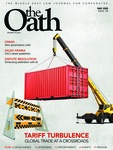News from the DRA – November 2016
- Jebel Ali Free Zone (Jafza), the UAE’s flagship trade and logistics hub for the Middle East region and Africa, has signed a MoU with the Dispute Resolution Authority (DRA) giving its member companies and people living, working and investing in the Free Zone access to a suite of dispute resolution services, including the Small Claims Tribunal of the DIFC Courts. Jafza and the DRA, will work together to develop initiatives to encourage greater cooperation between dispute resolution and mediation services provided by the two authorities. It will also promote the services of DRA, including the use of DIFC Courts. The agreement will provide Jafza member companies with a more efficient means of resolving disputes. The MOU was signed at DRA’s DIFC headquarters by Sultan Ahmed bin Sulayem, group chairman and CEO of DP World and chairman of Ports, Customs and Free Zone Corporation and Michael Hwang SC, head of the DRA. Bin Sulayem said Jafza was committed to providing new, value-added services to companies and individuals based in the Free Zone to support their operations and administration. The agreement will also provide Jafza and its member companies access to DRA’s knowledge series seminars, workshops and events through the DIFC Academy of Law. Jafza will also be able to host regular awareness sessions and a lecture series that will be conducted by the DRA. Other features of the agreement include the development of innovative solutions and use of smart technology such as joint mobile applications to streamline delivery of services.
- Trade ties between the UAE and China received a significant boost last month with the signing of a landmark cooperation agreement between two of the countries’ key commercial courts. The Shanghai High People’s Court and the DIFC Courts have agreed to work together to achieve shared strategic objectives, provide the basis for future judicial exchanges, and deliver legal excellence. The DIFC Courts are the first foreign commercial court to cooperate closely with the Shanghai High People’s Court, with the agreement designed to reinforce commercial links between the two cities by bringing certainty to businesses through enabling them to trade securely. Annual trade between the UAE and China is estimated to be worth in excess of USD55 billion annually, while more than 4,200 Chinese companies are currently operating in the UAE. The DIFC has particularly close links to China and is home to four of its biggest banks. The agreement was signed by the respective heads of the two courts, Chief Justice Michael Hwang and Vice President Sheng Yongqiang, ahead of Dubai Week in China. In a related but separate move, the DIFC Courts have published a guide for law firms and business on the mutual recognition and enforcement of monetary judgments in China and Dubai. It has been drafted jointly by the DIFC Courts and King & Wood Mallesons, and provides detailed explanation as to how a DIFC Courts judgement can be recognised and enforced in China, and vice versa. The guide is based on the existing 2004 Judicial Assistance Treaty between the People’s Republic of China and the UAE, and each court system’s own laws, and is available on difccourts.ae.
- DIFC Courts has collaborated with Alpha Data, one of the UAE’s leading systems integrators, to launch the GCC’s first smart Small Claims Tribunal (SCT). The pioneering ‘smart’ court is a turnkey project built on Microsoft infrastructure and works by providing both parties in dispute, as well as the judge, access to the case from remote locations on smartphones and computers. The newly-introduced smart court is equipped with video conferencing technology that enables individuals or small- and medium-sized enterprises (SMEs) to participate in hearings from anywhere in the world. According to the current court procedures, the parties in dispute along with a judge have to be present at Small Claims Tribunal (SCT) during hearings. Via the new technology, however, all parties concerned, such as business owners who travel extensively; tenants who have departed from the UAE; and employees both in and out of Dubai with contract issues, can resolve their disputes by remotely attending their consultations and hearings.

























































































































